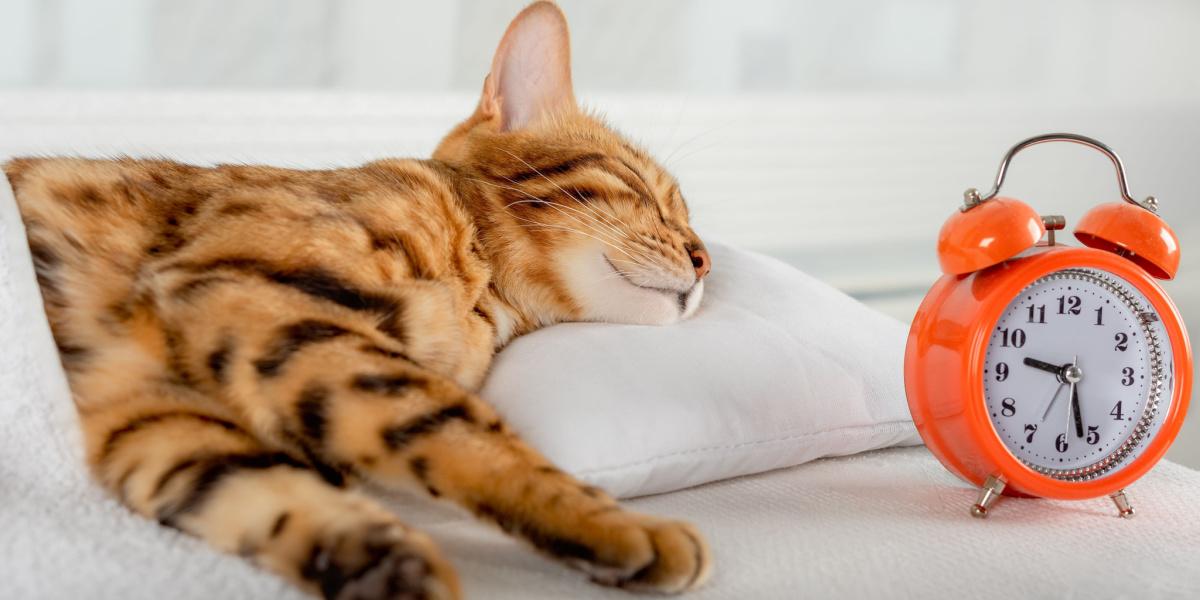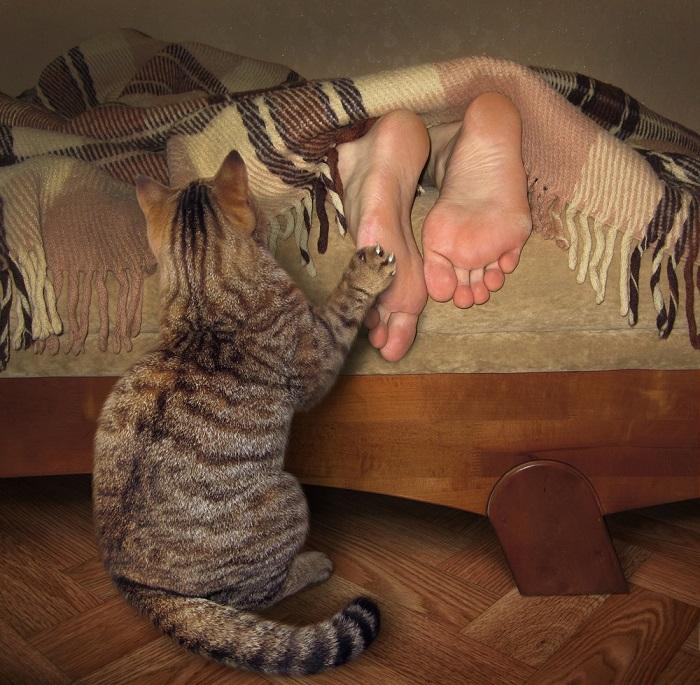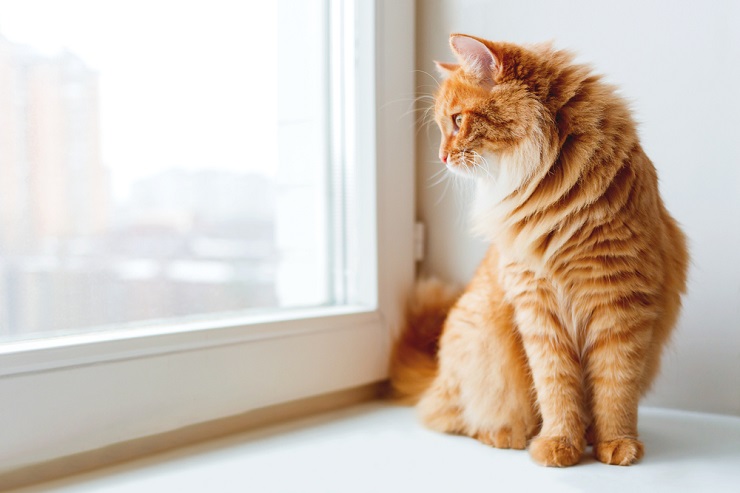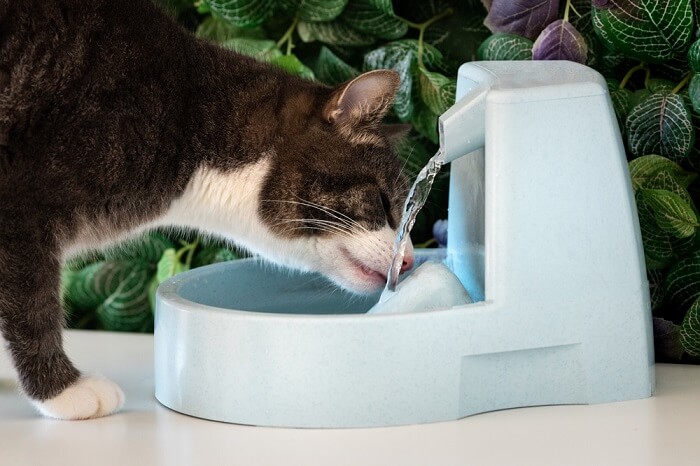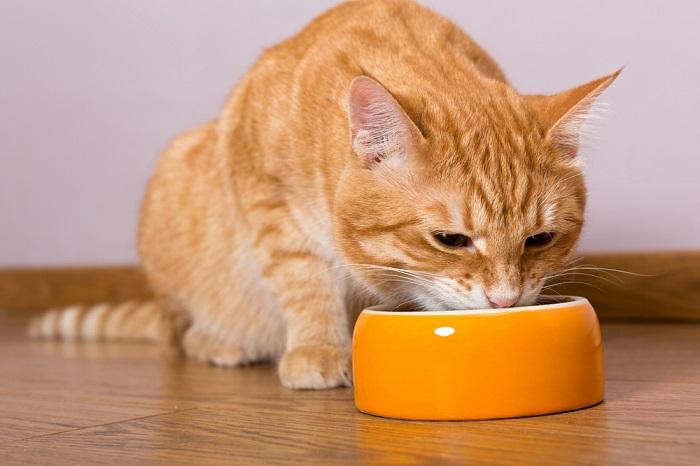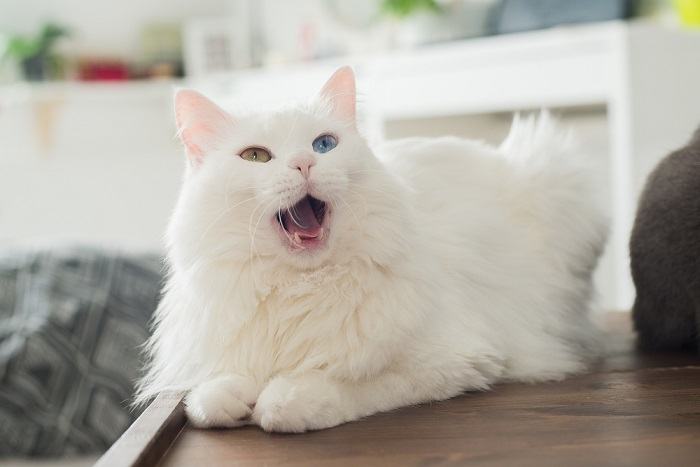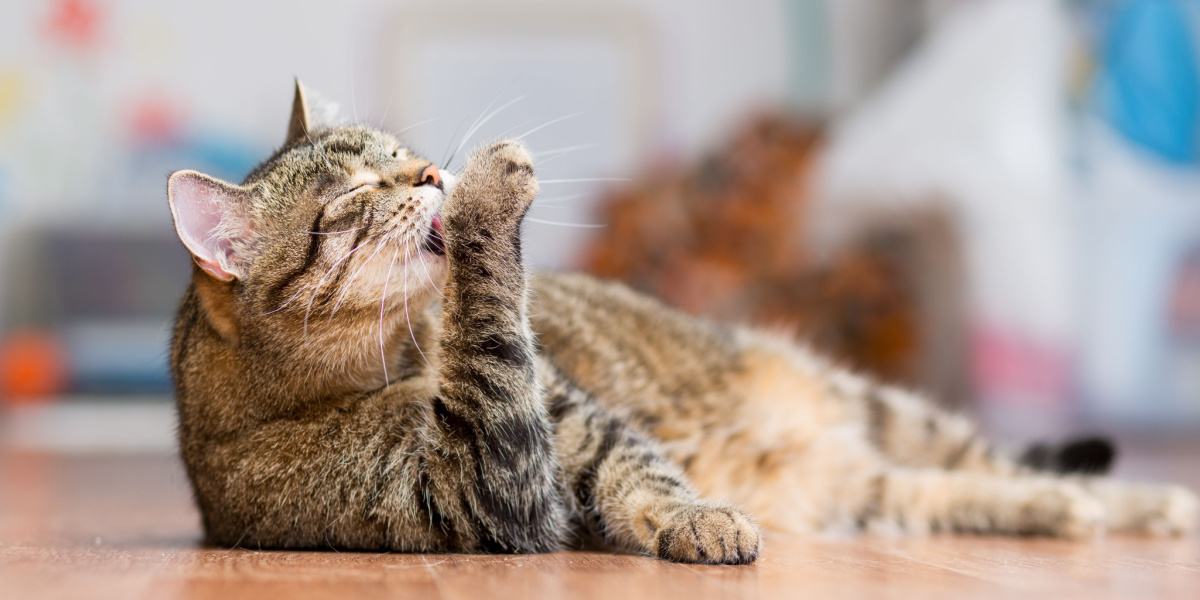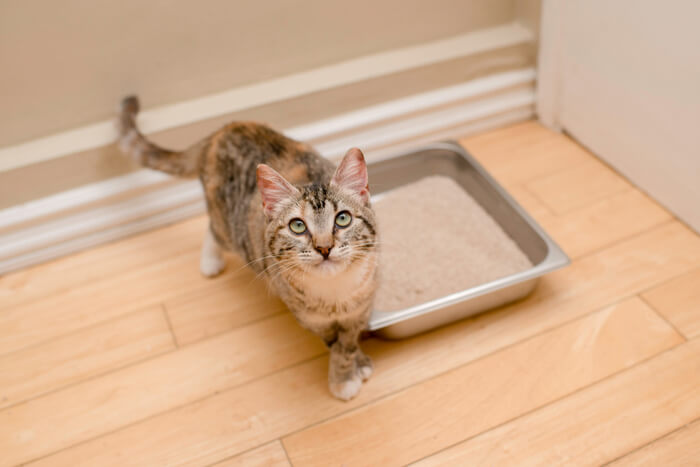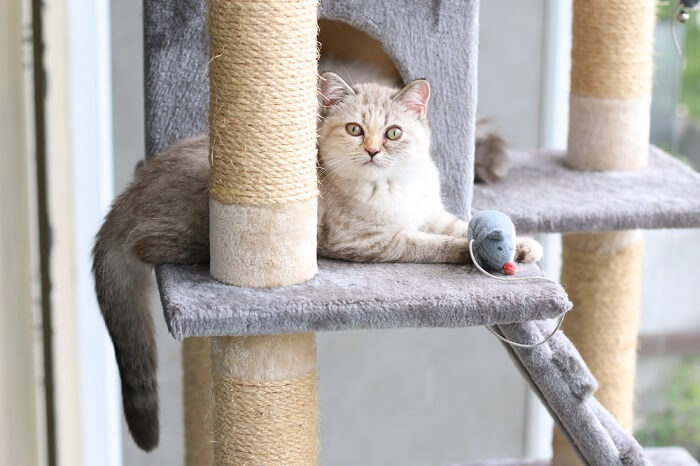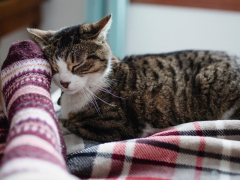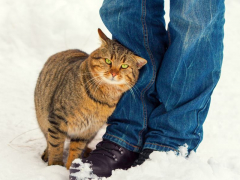You might notice that your cat follows a routine. Maybe they always hop on your lap for a snuggle at the same time, or regularly wait on the driveway when you arrive home from work. Cute, right?
Cats can't read clocks, but they have a sense of the general time of day. Cats have an internal clock that tells them when it's time to sleep and wake, and also recognize changes in daylight and outdoor sounds. Based on your daily routine, cats can tell what time you leave for work for the day and also have an idea of when you will return.Key Takeaways
Of course, some of their routine-fueled behaviors aren’t quite so endearing or welcome, even if you’re a cat lover. Like when they wake you up half an hour before your alarm clock goes off every morning, or they start shouting for food if you’re one minute late feeding them. But how do cats know what time it is? Do cats have a sense of time?
Can Cats Tell The Time?
Cats can read clocks, but they do have an idea of the general time.
Cats can’t tell the time in the conventional sense because they can’t read, let alone interpret a digital or analog clock. But how is it that your cat is ready and waiting when you come home from work, or wakes you up at practically the same time every day?
Just because cats can’t tell the time, doesn’t mean they don’t have an idea of what time it is. Let’s find out how.
How Do Cats Know What Time It Is?
A cat’s perception of time is different from ours, but there’s plenty of evidence around that can offer your domestic cat information about what time it is. They just have to look for it. Here are some of the ways your cat might be able to work out what time it is:
1. Your Behavior
Cats know their human family’s habits and schedules, and even notice how you’re dressed.
Cats are creatures of habit, and they love routine. You might not have realized, but they’ve probably memorized your routine and daily habits. For instance, they’ll know which family members leave the house to go to work or school, and know that they’ll stay away for a while. Over time, cats get used to how long cat owners are gone and are ready for their return, and this gives them an idea about the passage of time in a day.
It’s not just your comings and goings that give your cat an idea of the time of day. They’re also aware of your wake and sleep times, mealtimes, and bath or shower times if you’re a regimented washer! The tighter your routine, the more useful it is for your cat to tell the time.
Also Read: 10 Adorable Signs Your Cat Has Imprinted On You
2. Their Environment
Cats can tell the general time of day based on outdoor light and sounds that occur at certain times of day.
Cats can also get information about the time of day by how light or dark it is outside, how many people are out and about, and whether the birds are singing. They’re naturally more active at dawn and dusk, and sunrise and sunset give them two solid reference points.
Cats might also recognize noises or events that are a regular occurrence in their environment, like a neighbor’s dog barking or local children going to school.
Also Read: 7 Sounds Cats Hate That You Should Avoid
3. Their Body Clock
A cat’s internal clock helps wake and sleep at specific times.
Just like humans, cats have their own circadian rhythm, an internal clock that helps them recognize wake time and sleep time. They will also pick up on body cues like feeling tired, hungry, or thirsty, to give them an idea of how much time has passed and remind them to nag you for food or wake you up.
Also Read: How To Take Care Of A Kitten: The Complete Guide
4. Their Routine
Cats like a solid routine—always knowing what to expect next can help them keep track of time.
As previously mentioned, a cat’s routine is really important to them. Cats often repeat the same behaviors and habits every day. They might wake up, and go outside in the early morning, then a pang of hunger might remind them it’s time for breakfast.
Cue them jumping on your chest while meowing or purring loudly, then they eat breakfast and head to the couch for a catnap. If you spot your cat doing the same thing every day, it’s probably helping them stay aware of what time of day it is.
What If A Cat’s Routine Changes?
Cats often become very stressed and anxious if their routine is disrupted.
Cats can be very reliant on their routine and the routine of their owners. If their routine or their environment changes, even in a subtle way, they might become stressed. This could be something as small as a change of fragrance in the living room, or something as big as their owner moving jobs and being out of the house more.
Stress can cause a change in your cat’s behavior. Signs of stress in cats include vocalizing, hiding, scratching furniture, or passing urine around the house. In more severe cases, this can progress to overgrooming and bald patches or painful cystitis.
Also Read: How To Tell If A Cat Is Angry
1. Overgrooming
Overgrooming leads to hair breakage and sore skin.
Stressed cats will often overgroom, licking and licking an area of fur until the hairs break and the skin becomes sore. If your cat is overgrooming, you might find clumps of fur around the house, you might notice bald spots on your cat or their fur might feel rough and bristly. Cats often overgroom their bellies, or the inside of the hind legs, so it might not be obvious when you look at them.
Also Read: Best Cat Grooming And Deshedding Gloves
2. Cystitis
Inflammation of the bladder wall makes cats feel a constant urge to pass urine.
Stress can cause inflammation of the bladder wall. This can mean your cat feels the urge to pass urine all the time. You might notice them crouching and straining to pee in the litter box, but only a small amount of urine is produced.
There might even be some blood in the urine. If left untreated, cystitis can sometimes lead to a blocked bladder, especially in male cats, and this is a veterinary emergency.
Also Read: Bladder Stones In Cats: Causes, Symptoms & Treatment
How Can You Help A Stressed Cat?
Identify the things that are making your cat upset so you can help them to feel less stressed.
If your cat is showing signs of stress, see if you can identify the cause. For instance, if there’s a new baby in the house or a new cat in the neighborhood, this could easily be the root of the problem. However, even if you work out the reason, you might not be able to resolve the issue, especially if it’s someone else’s pet.
Regardless of the cause, it’s a good idea to get your cat checked over by a vet if they are showing signs of stress, cystitis, or skin lesions. You can try using calming sprays or pheromone diffusers around your home to ease your cat’s anxiety and try to provide plenty of safe, calm, and cozy spaces where your cat feels secure.
If your cat has separation anxiety, provide plenty of toys, activities, and puzzle feeders to help keep them occupied while you’re away. You can also leave clothing that smells of you and try leaving the radio or television on so that they don’t feel so alone. Finally, ensure that you spend quality time with them when you are around, to help reassure and calm them.
Also Read: The 10 Best Cat Slow Feeders & Puzzle Feeders
Final Thoughts
Cats understand the concept of time passing and can figure out what general time it is by looking for clues in their environment.
Although cats can’t tell the time using a clock or watch, they definitely understand the concept of time passing and have an idea of what time of day it is. It might seem advanced, but cats can use information from the world around them to let them know what time it is and when they can expect food, playtime, or just your company.
Also Read: 7 Signs Your Cat Is Not Getting Enough Love
Frequently Asked Questions
Do cats have a sense of time when left alone?
Cats become familiar with their owner's routine and this gives them an idea of when to expect you back. They might also use body cues like hunger, thirst, and tiredness to help them decide how much time has passed.
Do cats know how long you are gone?
Cats don’t know how long you are gone in minutes or hours. However, if being alone is part of their routine, they’ll certainly notice if you’re suddenly away for a longer or shorter time.
Can cats miss their owners?
Many cats miss their owners when they’re on their own. Separation anxiety can lead to stress and health issues like cystitis and overgrooming, so it’s best to speak to a veterinarian or behaviorist if you’re concerned.
Do cats get sad when you leave?
Cats might enjoy their alone time, but they can also suffer from separation anxiety. The most important factor that causes stress in cats is a change in routine. So, if you regularly leave your cat, and have done for a long time, it's unlikely to suddenly become a problem. On the other hand, if your circumstances change and you’re suddenly away from home a lot, your cat might become quite anxious.
